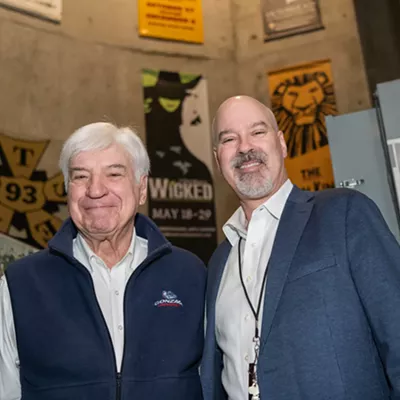As American soldiers range across Afghanistan, with more arriving daily to prepare for an invasion of Iraq, there are other Americans on a completely different mission fanning out in some of the most dangerous parts of the Middle East. These mercenaries don't carry guns, however, and the only orders they take come from their own consciences. Their payment comes in the form of a smiling child, an old man's embrace or a mother's tears of thanks. These are the humanitarians who come to help put back together what war has torn apart. If there were ranks to be given out among this battalion, Spokane's Doug Beane might be a general.
We first reported on Beane's work about a year ago, just after 9/11. We heard he was headed into the eye of the storm in Afghanistan on a humanitarian mission, and we wanted to hear why. Now Beane is planning to return to Pakistan, where, as program director for Church World Services, he administers health programs for refugees from Afghanistan who are still displaced by last year's upheaval.
The attack on the World Trade Center was followed by the overthrow of the Taliban, and those two events caused Church World Services to shut down travel to and from Pakistan. Shortly before our interview last year, however, the Pakistan government had succeeded in bringing enough order so that safe passage could be assumed if not guaranteed. Shortly after we talked, Beane got back on a plane and flew to Pakistan.
Since that trip, Beane has completed two more trips, the last being his longest (three months). He now readies for another, to begin this month and likely to last two months. In June 2003, Doug will turn 65, and he has promised his brave but frightened wife, Valary Compton, that he will retire -- with no more trips to the front after retirement.
When we sat down with him just before Christmas, we couldn't help but think about the movie Memphis Belle, in which World War II bomber crews had to fulfill a set number of missions before being decommissioned.
"I actually feel safer now in Afghanistan than in Pakistan," Beane said as we started our interview. "Terrorists are targeting Christians. Since they have more difficulty getting at Americans, they are going after Pakistani Christians; they are the ones in real danger."
Seven Christians were murdered last September by terrorists only a short distance from World Church Services headquarters, which has been transformed into a fortress since 9/11. All seven were Pakistanis working for a Christian welfare organization; they were shot while working in their downtown Karachi office.
To underscore his heightened concern for his own safety, he told us about his changed living arrangements. On his first trip back to Karachi after the Taliban fell, Beane returned to his hotel -- located near the restaurant where Wall Street Journal writer Daniel Pearl was last seen alive. Now that hotel is no longer considered safe, and he lives inside the guarded compound. When he leaves the compound, he is at great risk. On more than one occasion, he has had to change his plans because the police have informed him that they can't guarantee his safety. Beane always accepts their judgment.
While he has used a police escort -- from two to six police officers -- he expressed little confidence in their effectiveness. "The police are thoroughly corrupt. If the shooting begins, they will vanish," he said, finishing his thought with, "Or they will be the ones firing the shots."
Pakistan has become a very, very dangerous place, he says, especially for Americans. We asked about Pakistan's president, Pervez Musharaf, and if his reforms are working. A large part of the problem, in Beane's opinion, lies inside the intelligence establishment. "Many of these people supported the Taliban. Many also supported Al Qaeda." While President Musharaf might have succeeded in weeding out some of the higher ranking and more obvious suspects, Beane believes that the problem remains deeply entrenched. Perhaps it's no coincidence that President Musharaf relies on an American bodyguard.
He adds that Pakistan is in a precarious situation, with the fundamentalist Islamic political party having made a surprisingly strong showing in the recent elections. Pakistan feels that it deserves more consideration from the United States for having joined them in the fight against the Taliban and the war on terror. Always a major manufacturer of garments, Pakistani business leaders were upset last year when President George Bush refused to remove a tariff on garment imports that would have helped the nation's struggling economy. Musharaf has opted out of active participation in any war in Iraq, perhaps because of the impact it could have on his regime. Pakistanis are frightened, too, of what war in Iraq may do to their economy. As a Middle Eastern country, few would think Pakistan has no oil, but that's the case -- all of its oil is imported.
"A lot of the repercussions of this coming war are hard to understand," said Beane.
What about life in Afghanistan after the Taliban? Has the situation improved? Beane offered mixed reviews. As an example, he discussed the several women physicians who work in the Church World Services' clinics: "Three out of four actually continue to wear burqas while in public, but they now take them off and wear only scarves when they arrive at work," he said. "Nor do they work in tents only with other women."
And while finding qualified doctors and keeping them is a struggle, there are other signs of improvement. Women and girls are now going to schools that have reopened in Kabul. But in much of the rest of the country, places like Jalalabad, 100 percent of the women are still wearing burqas (a cultural tradition that predated the Taliban, said Beane) and infrastructure like schools has been slow to reemerge. That may explain why in the past year, nearly 700,000 refugees have descended on Kabul. Beane related one tragic story of the effects of such overcrowding during this harsh winter -- 50 street children were found frozen to death after one particularly cold night.
Meanwhile, Church World Services runs nine different refugee camps along the Pakistan-Afghanistan border, serving about 60,000 people who have yet to return to their homes.
Beane said the Afghanis and Pakistanis he works with harbor no ill will toward America, but it's a different story among the majority of uneducated, underemployed Pakistanis. So what can America do to improve things on the Arab street?
"We can't leave Afghanistan to fend for itself," said Beane.
What about war with Iraq? "It would help a lot if it was a very short war -- the shorter the better."
A skeptic about a war against Iraq, Beane expressed real concern over its impact on stability throughout the region. Still, he can't be considered a pacifist. When asked, he said, firmly, "The Taliban got what they deserved. They brought it down on their own heads."
We sat down with Beane with the intent of getting an update, but as our interview progressed, we sensed that we had another story. Beane didn't offer up his background, but as we coaxed it out of him it was impressive: Here's a gentle, soft-spoken man who has spent much of his adult life fighting the humanitarian battles that must be won after the soldiers leave the battlefields.
He first experienced war in 1964 during Vietnam. But at that time, he was on the front end of things as a naval officer. He finished a two-year tour of duty in 1966, then returned to his home state of Massachusetts. While taking classes at Harvard in its East Asian Studies department, he learned through a friend of an organization that was operating in Vietnam, too: Church World Services, a non-governmental, ecumenical organization funded by 36 Protestant denominations dedicated to providing relief.
So in 1967, Beane went back to Vietnam, this time as a relief worker, and stayed through that conflict's bloodiest years until Saigon fell in 1975. "I believe I was on the last plane out before the helicopters evacuated the embassy," he recalled.
While he had the distinction of being one of the last Americans out, he was also among the first to return. Less than a year after the Communists reunited the country, he returned to find the human suffering just as bad as it was during the war. He stayed through the early '80s, administering Church World Services programs both in Thailand and Vietnam, including the area around My Lai village, site of the infamous massacre of Vietnamese civilians.
Has this been more of a calling than a career, we asked?
He pondered our question. A quiet, unpretentious man, he is not one to engage either in hyperbole or dramatics. But his feelings run deep, and his sense of justice unmistakable.
"I believe that we should help people who find themselves in terrible situations not of their own making," he responded. "While there is a certain amount of risk, the need is great. We should help the neediest of the needy."
So is it your Christian obligation?
"You can call it that," he said, "or, if you feel more comfortable, just call it my obligation as a human being."
Here was a man uniquely qualified to comment on the aftermath of modern warfare. What wisdom has he gleaned from such an up-close perspective? What can the rest of us learn from his experiences, here on the eve of his last sorties to the front before retiring? Scanning the long vista of his life, he choked up.
"I will say this," he mustered, "if I ever had a chance to produce a movie about all this, I would call it Collateral Damage. That's what all this is. We demonize our enemies -- we demonized the Vietnamese, and we're demonizing the Iraqis. But it's bullshit," he hissed.
"This is about people. It's flesh and blood and bones," he said, sounding as if he'd seen too much of it. "It's human beings."
After another pause, he continued: "We should have learned that there are some problems that don't easily lend themselves to being solved through force," Beane concluded. "War should be the last resort."
To donate to Church World Services, visit their Web site at www.churchworldservice.org or call 800-297-1516.





















